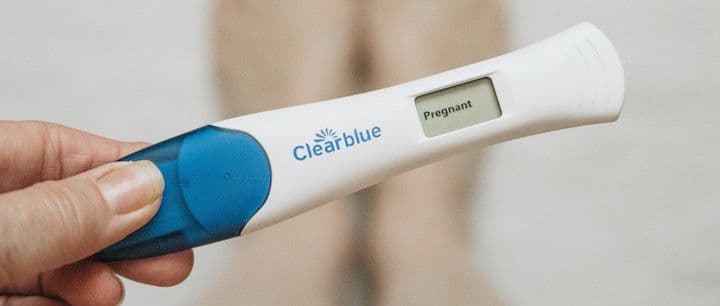When To Take a Pregnancy Test Calculator
Tools
Obie Editorial Team

When is the best time to take a pregnancy test? How soon can I take it, and when does it become positive? When you're trying to conceive you want to take that pregnancy test as soon as possible. Find out when the time is right.
Pregnancy Test Calculator
Take our fertility test and get a free personalized report to help you improve your fertility.
When to take a pregnancy test
A positive pregnancy test will usually show up around the time of your missed period, on average 14 days after ovulation/fertilization, and rarely earlier than 9-10 days after fertilization/ovulation. Even if the pregnancy test is negative, there is still a chance of getting a positive pregnancy test later on.
A pregnancy test, no matter if it's blood or urine, only becomes positive after implantation, when the fetus has attached to the uterine wall and connects with the mother's blood system. Implantation, when the fertilized egg implants into the endometrium, happens about 9 days after ovulation and fertilization (range: 6-12 days). The blood pregnancy test will be positive 2-3 days after implantation and the urine test will be positive several days after the blood test has become positive.
When is the early pregnancy test positive?
An early urine pregnancy test will not show up positive until there is enough hCG, the pregnancy hormone, in your body. This hormone isn't even present until several days after the fertilized egg implants into your uterus. Implantation happens 6-12 days after you ovulate. It isn't detectable until around the time of your period (some women don't get a positive result until days after a missed period). While other women are able to take an early pregnancy test (like First Response) a couple of days before their period is due and get a positive test. However, that is not the case for MOST women. Have you ever heard of a "false negative"? It's when you ARE pregnant, but get a negative test and then test a few days later and get a positive. That's what happens most of the time when women test before their periods.
First Response (the test that advertises "99% accurate. Our most accurate results 5 days sooner"), says the following regarding it's accuracy: "4 days before your period, the test is 63% accurate; 3 days before your period 83% accurate; one and two days before 93% accurate." So it's most accurate around the time you miss your period.
When you do a pregnancy test too early, you may get a false negative pregnancy test and be disappointed. Waiting until you miss your menstrual period and until your menstrual period is late, maybe 1-2 days late, will save you money and will give you a better chance to prevent a false negative pregnancy test. A healthy mid-twenties couple without known fertility problems has a 20% chance each month of getting pregnant. 80% will get pregnant within the first year of trying.
What about an at-home urine test?
The best time to take an at-home pregnancy test is first thing in the morning and with your first morning urine. This is when the urine is most concentrated and has the highest level of the pregnancy hormone hCG. Try not to get up and go to the bathroom during the night and then do the test as soon as you get up.
Despite what many manufacturers of urine pregnancy tests want you to believe, the urine pregnancy test will usually not become positive in most women until about a week after implantation, around the time of a missed period.
Had a negative pregnancy test? Find out what the chances are that you could still be pregnant even though you had a negative pregnancy test.
When the pregnancy test first becomes positive has a wide variation and depends on several variables. The following variables determine when the home urine pregnancy test becomes positive:
Exact day of ovulation: A urine pregnancy test is usually positive 4-5 days after implantation. However, it's the day of ovulation that's important too, as implantation can only happen if ovulation took place and the egg was fertilized. So if your day of ovulation was later than you thought, then implantation and subsequently the pregnancy test are further delayed, too. That is why it's really important to keep track of your ovulation day so you can start counting the days to implantation, and eventually the positive pregnancy test.
Timing of implantation: After ovulation, the egg gets fertilized and travels through the fallopian tube toward the uterus. This travel takes on average about a week. Implantation, the attachment of the fertilized egg in the lining of the uterus, occurs on average about a week or later after ovulation/fertilization, but it can happen as early as six days and as late as 12 days after fertilization/ovulation.
At the time of implantation, the placenta starts making the pregnancy hormone hCG, which then enters the bloodstream. hCG can be detected in the blood about 3 to 4 days after implantation. Urine hCG can be detected about 2 to 3 days after blood hCG can first be seen. Detection of hCG depends on the timing of implantation so hCG can normally be detected in the blood between 9 and 16 days after ovulation (HPT: 12-19 days after ovulation).
Are there variations in hCG levels?
There is a wide normal variation of hCG levels, both in the blood and the urine. If a woman has low blood hCG levels, for example, then it can take several more days for it to show up on a pregnancy test.
Urine hCG levels change over the course of the day depending on how much you drink and how diluted or concentrated the urine is. Urine pregnancy testing is best done with more concentrated urine. If you drink a lot of fluid, the urine may be too diluted early on in the pregnancy to achieve an hCG concentration adequate for a positive test.
Are all pregnancy tests the same?
Different pregnancy tests have different sensitivities. The lower the sensitivity, the earlier a pregnancy test becomes positive. Sensitivities are indicated in mIU/mL, the lowest amount of hCG in the urine that tests positive. A sensitivity of 20 mIU/mL requires one-half the hCG level to be positive when compared with a 40 mIU/mL sensitivity level, and it may become positive several days earlier than the pregnancy test with higher sensitivity. Make sure you read the package of the pregnancy test to determine your pregnancy test's sensitivity.
Read More










